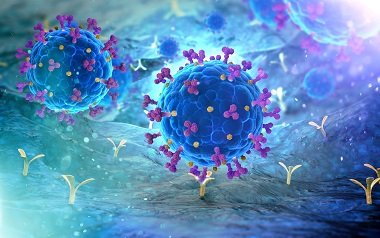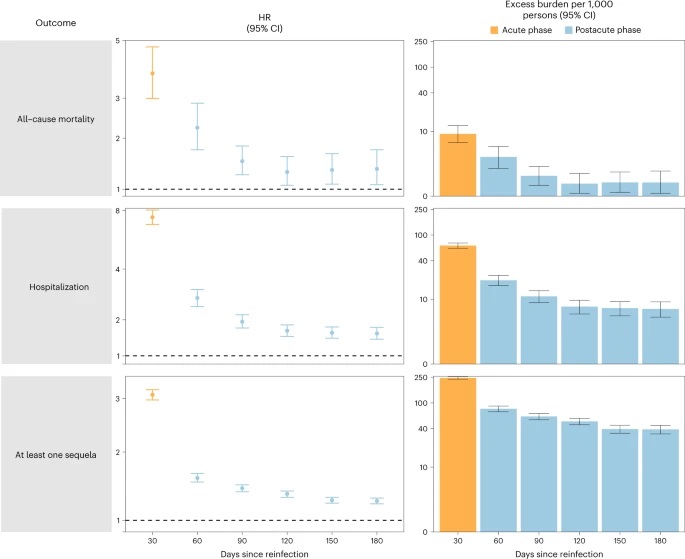U.S. Study Shows That SARS-CoV-2 Reinfections Increases Risk Of Hospitalization, Mortality And Sequelae Irrespective Of Vaccination Status!
Source: SARS-CoV-2 Reinfections Nov 11, 2022 3 years, 3 months, 2 weeks, 6 days, 10 hours, 9 minutes ago
SARS-CoV-2 Reinfections: We have more great news just at the opportune time as more Omicron variants and sub-lineages along with recombinant variants that are more immune evasive and able to cause breakthrough infections and reinfections have emerged and are slowly becoming predominant in circulation especially just in time for winter.
A new study by researchers from the Clinical Epidemiology Center, Research and Development Service, Veteran Affairs Saint Louis Health Care System, St. Louis-USA have found that SARS-CoV-2 reinfections increases the risk of hospitalization, mortality and sequelae irrespective of vaccination status!

This new study findings contradicts earlier statements by so called “experts” who misleadingly made comments that
SARS-CoV-2 Reinfections do not produce more worse off outcomes!
Typically, initial infection with severe acute respiratory syndrome coronavirus 2 (SARS-CoV-2) is associated with increased risk of acute and post-acute death and sequelae in various organ systems. Whether reinfection adds to risks incurred after first infection is unclear.
The study team used the US Department of Veterans Affairs’ national healthcare database to build a cohort of individuals with one SARS-CoV-2 infection (n = 443,588), reinfection (two or more infections, n = 40,947) and a noninfected control (n = 5,334,729).
The study team used inverse probability-weighted survival models to estimate risks and 6-month burdens of death, hospitalization and incident sequelae.
The study findings showed that compared to no reinfection, reinfection contributed additional risks of death (hazard ratio (HR) = 2.17, 95% confidence intervals (CI) 1.93–2.45), hospitalization (HR = 3.32, 95% CI 3.13–3.51) and sequelae including pulmonary, cardiovascular, hematological, diabetes, gastrointestinal, kidney, mental health, musculoskeletal and neurological disorders. The risks were evident regardless of vaccination status.
It was also found that the risks were most pronounced in the acute phase but persisted in the post-acute phase at 6 months.
According to the study team, compared to noninfected controls, cumulative risks and burdens of repeat infection increased according to the number of infections.
Study limitations included a cohort of mostly white males.
The study findings clearly shows that reinfection further increases risks of death, hospitalization and sequelae in multiple organ systems in the acute and post-acute phase. Reducing overall burden of death and disease due to SARS-CoV-2 will require strategies for reinfection prevention.
The study findings were published in the peer reviewed journal: Nature Medicine.
https://www.nature.com/articles/s41591-022-02051-3
This is the first large cohort study investigating the effects of SARS-CoV-2 reinfections and it involved 5,819,2
64 people, including 443,588 people with a first infection, 40,947 people who had reinfection and 5,334,729 noninfected controls.
 Risk and 6-month burden of all-cause mortality, hospitalization and at least one sequela of SARS-CoV-2 reinfection versus no reinfection in 30-d intervals covering the acute and postacute phases of reinfection. Incident outcomes were assessed from reinfection to the end of the follow-up. Results from SARS-CoV-2 reinfection (n = 40,947) versus first SARS-CoV-2 infection (n = 443,588) by time since reinfection were compared. Adjusted HRs (dots) and 95% CIs (error bars) are presented for each 30-d period since the time of reinfection, as are the estimated excess burden (bars) and 95% CIs (error bars). Burdens are presented per 1,000 persons at every 30-d period of the follow-up from the time of reinfection.
Risk and 6-month burden of all-cause mortality, hospitalization and at least one sequela of SARS-CoV-2 reinfection versus no reinfection in 30-d intervals covering the acute and postacute phases of reinfection. Incident outcomes were assessed from reinfection to the end of the follow-up. Results from SARS-CoV-2 reinfection (n = 40,947) versus first SARS-CoV-2 infection (n = 443,588) by time since reinfection were compared. Adjusted HRs (dots) and 95% CIs (error bars) are presented for each 30-d period since the time of reinfection, as are the estimated excess burden (bars) and 95% CIs (error bars). Burdens are presented per 1,000 persons at every 30-d period of the follow-up from the time of reinfection.
Alarmingly, the study findings showed that compared to individuals with no reinfection, people who had reinfection exhibited increased risks of all-cause mortality, hospitalization and several prespecified outcomes. The risks were evident in those who were unvaccinated and had one vaccination or two or more vaccinations before reinfection. The risks were most pronounced in the acute phase but persisted in the post-acute phase of reinfection, and risks for all sequelae were still evident at 6 months.
The study findings suggest that for people who have already been infected once should continue vigilance to reduce the risk of reinfection to lessen the overall risk to one’s health.
Considering that the SARS-CoV-2 is still continuing to evolve rapidly and are spawning numerous new variants and sub-lineages that are more immune evasive and able to cause breakthrough infections irrespective of being vaccinated or having contracted earlier SARS-oV-2 variants, there is an urgent need to develop strategies and measures to prevent re-infections. The current vaccination and booster strategies are not up to date and in par with the rate of the virus evolution and emergence of new immune evasive variants and sub-lineages.
Other pharmaceutical and nonpharmaceutical interventions to lessen both the risk of reinfection and its adverse health consequences are also urgently needed.
The study without doubt also shows that reinfection increases the risk of long COVID and in many cases actually aggravates existing conditions.
Evidence also suggests that the reinfection risk is especially higher with the Omicron variant, which was shown to have a marked ability to evade immunity from previous infection. Any protection from previous infection (against reinfection and its severity) also wanes over time; evidence suggests that protection from reinfection declined as time increased since the last immunity-conferring event in people who had previously been infected with SARS-CoV-2, regardless of vaccination status.
https://pubmed.ncbi.nlm.nih.gov/35613036/
The study findings also warns that impaired health as a consequence of the first infection might result in increased risk of adverse health consequences upon reinfection.
The study findings expand this evidence base and show that in people who get reinfected, reinfection (compared to no reinfection) further increases risk in both the acute and post-acute phases and that this was evident even among fully vaccinated people, suggesting that even combined (a hybrid of) natural immunity (from previous infection) and vaccine-induced immunity does not abrogate the risk of adverse health effects after reinfection. The totality of evidence suggests that strategies to prevent reinfection might benefit people regardless of previous history of infection and vaccination status.
For the latest on
SARS-CoV-2 Reinfections, keep on logging to Thailand
Medical News.

